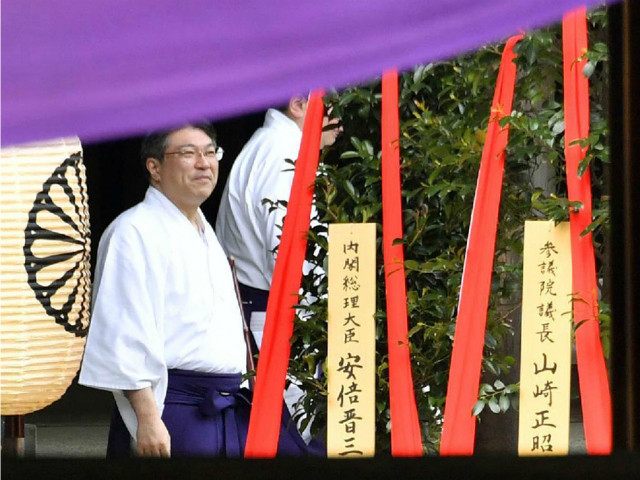Japanese Prime Minister Shinzo Abe has once again irritated the Chinese government by sending an offering to the Yasukuni Shrine, a Shinto shrine for Japan’s war dead that honors more than a dozen convicted war criminals.
In honor of Japan’s spring festival, Abe sent a masakaki tree to the Yasukuni Shrine, signed with his name. The trees are ritually given during the change of season festivals as offerings to the dead honored there. The Japan Times notes that the Reitaisai ceremony will continue through Sunday, but Abe is not expected to make a visit personally to the shrine. Japanese Health Minister Yasuhisa Shiozaki, Lower House Speaker Tadamori Oshima and Upper House president Masaaki Yamasaki all sent their masakaki trees as well, but will not be visiting.
The Yasukuni Shrine is a place of prayer for those who have died in Japanese wars. The Japan Times notes that believers go there to pray for the souls of 2.46 million people who died in wars, most soldiers. China and South Korea object to honorific acts at the shrine because many of those honored there served in World War II. Twelve of those whose souls are honored there were convicted and listed as Class-A war criminals.
Chief cabinet secretary Yoshihide Suga explained that, as Abe sent his offering as a private citizen and with his own money, he did not feel the government had to comment on his private religious act.
Japanese Foreign Minister Fumio Kishida has a visit to China scheduled next week, though the diplomatic context did not stop the Chinese government from condemning Abe. “We urge Japan to honestly and deeply reflect on its invasion history, demarcate a complete boundary on militarism, and take practical actions to win back the trust of its Asian neighbors and the international community,” Chinese Foreign Ministry spokeswoman Hua Chunying told reporters Thursday.
“The Japanese side should face up to and deeply reflect on the history of the invasion, make a clean break from militarism, and regain trust from its Asian neighbors and the international community with concrete action,” Hua added.
Abe visited the shrine personally in 2013, causing an international uproar. At the time, the Chinese Foreign Ministry issued a statement saying Abe was “not welcome” anywhere in China for his visit honoring Japan’s veterans, and that he had significantly set back bilateral diplomacy. China’s ambassador to the UK, Liu Xiaoming, compared the Yasukuni Shrine to a horcrux, an item containing a piece of Lord Voldemort’s soil in the Harry Potter series.
Reports at the time cited Abe’s previous statements about the shine before his visit, in which he argued that he was not looking to hurt the feelings of the victims of imperial Japan, but that their outrage was a “misunderstanding.”
He has not visited since, though for many it is a tradition to send offerings to Yasukuni during spring and autumn festivals. Intervention by the United States, which issued a statement calling his 2013 visit “disappointing,” may have had an effect. After Abe’s visit to the shrine, it was reported that Vice President Joe Biden spent a “tense” hour on the phone trying to convince Abe not to. While he failed, Abe has never returned, even though a year later, a group of 146 Japanese legislators made a pilgrimage to the shrine.
Japanese politicians have not been the only ones to incur the wrath of the international community for visiting the shrine. In 2014, the Chinese government condemned Canadian musician Justin Bieber for posting a photo on the social media network Instagram of himself praying at the Yasukuni Shrine. Bieber apologized for taking a photo there, acknowledging that he did not know what the location was, describing it as merely a “beautiful shrine.” “I was mislead [sic] to think the Shrines were only a place of prayer,” he wrote in his apology.

COMMENTS
Please let us know if you're having issues with commenting.